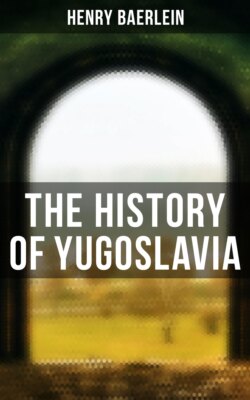Читать книгу The History of Yugoslavia - Henry Baerlein - Страница 97
На сайте Литреса книга снята с продажи.
RIEKA'S HISTORY, AS TWO PEOPLE SEE IT
ОглавлениеMr. Susmel begins by saying that the origins of the Italianity of Rieka lose themselves in the story of Rome. He knows—none better—that the Romans came to these parts. They disappeared—but of course one can't put in every detail. Anyhow, they left an arch, a lot of coins, some vases, etc.; and a few of these are depicted in Mr. Susmel's book. What a relief it must have been to innumerable people as they turned his pages and discovered that he had forgotten to include the illustrations of our Roman Wall, of the Pont du Gard and of the glorious aqueduct that traverses Segovia! From the time of the "Krpitsa" onwards a regular colonization began. Italians were urged to come from their own country—but if Mr. Hilaire Belloc, who studied the question on the spot, is accurate in his diagnosis that Fiume is Italian "with that intensity of feeling bred by alien rule and the sudden victorious liberation therefrom" (Land and Water, May 29, 1919), it certainly does seem a little strange that the Italians should think in this way of the Magyars who invited them and were so good to them. They were told, no doubt, by the Magyars that the Croats would not hurt them, that the city council would always be Italian, that if the saucy Croats asked for schools—as indeed their numbers entitled them to do—well, they would receive no reply. ("Show me a single Croat school!" cried the Italian mayor triumphantly to me in 1919.) The Magyars spent vast sums on the harbour, making the other little harbours of Croatia obsolete, and they were not going to lose their grip of the town for want of proper legislation. They were surprised that more "regnicoli" (Italians from Italy) did not respond; but the renegades made up for them. "Passionate and justified," said Mr. Hilaire Belloc in 1919,[52] is Italian feeling with respect to Fiume. But this writer, who says he travelled to the Adriatic with a view to ascertaining the real facts, did not altogether waste his time, since one of his two adjectives is quite correct. With regard to the renegades no questions were ever asked, if only one helped to keep Rieka from the Croats, if, for example, on a voting paper for the Croatian Diet one put the word "nessuno" (no one). Mr. Susmel, I see, says that the Diet's continued invitation to the town that it should send its deputies to Zagreb was a display of "incredible obstinacy."
